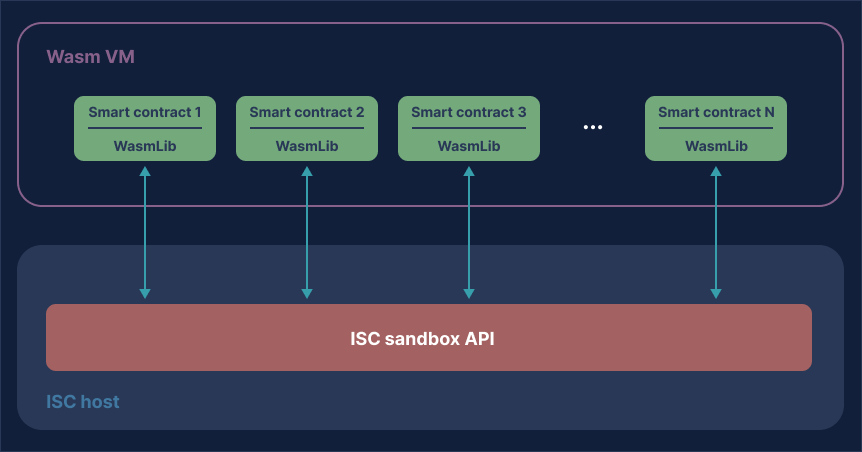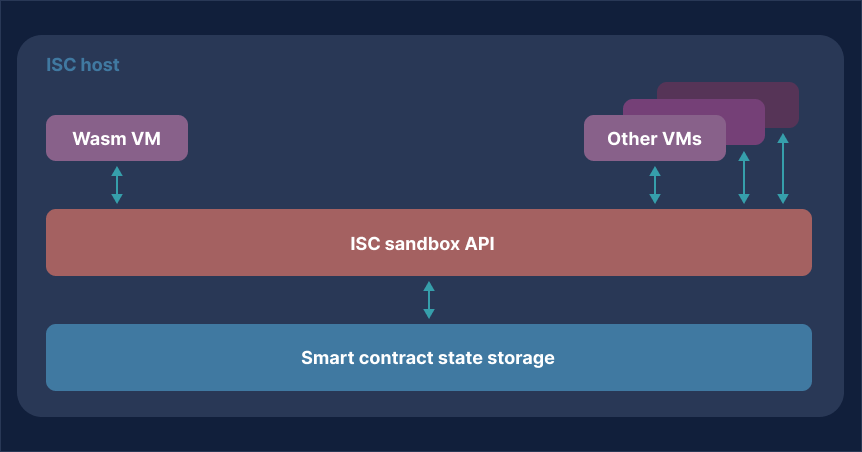intro
The Wasm VM is still in an experimental state, it is a testament to the "VM plugin" architecture of ISC.
Experiment away, but please don't rely on it for any valuable applications (stick to EVM for now).
Introduction to the Wasm VM for ISC
IOTA Smart Contracts (ISC) provides a very flexible way of programming smart contracts by providing an API to a sandboxed environment that allows you to interact deterministically and without any security risks with ISC-provided functionality. The API provides a generic way to store, access, and modify the state of smart contracts. The API can be used by any kind of Virtual Machine (VM) to implement a system to load and run smart contract code on top of ISC. The actual VMs can be implemented by whoever wants to create them.
Of course, we provide an example implementation of such a VM to allow anyone to get a taste of what it is like to program a smart contract for ISC. Our VM implementation uses WebAssembly (Wasm) code as an intermediate compilation target. The implementation of the Wasm VM currently uses the open-source Wasmtime runtime environment. The Wasm VM enables dynamic loading and running of smart contracts that have been compiled to Wasm code.
We chose Wasm to be able to program smart contracts from many programming languages. Since more and more languages are becoming capable of generating the intermediate Wasm code this will eventually allow developers to choose a language they are familiar with.
Because each Wasm code unit runs in its own memory space and cannot access anything
outside that memory by design, Wasm code is ideally suited for secure smart contracts.
The Wasm VM runtime system will only provide access to external functionality that is
necessary for the smart contracts to be able to do their thing, but nothing more. In our
case, we only provide access to the ISC host's sandboxed API environment. The way we do
that is by providing a small, self-contained library that can be linked to the Wasm code.
This library is called WasmLib.

As you can see, we can have any number of smart contracts running in our Wasm VM. Each smart contract is a separately compiled Wasm code unit that contains its own copy of WasmLib embedded into it. Each WasmLib provides the ISC sandbox functionality to its corresponding smart contract and knows how to use it to access the underlying smart contract state storage through the VM runtime system. This makes the ISC sandbox API access seamless to the smart contract by hiding the details of bridging the gap between the smart contract's memory space, and the otherwise inaccessible memory space of the ISC host.
The ISC sandbox environment enables the following functionality:
- Access to smart contract metadata
- Access to request data for smart contract function calls
- Access to the smart contract state data
- A way to return result data to the caller of a smart contract function
- Access to tokens meant for the smart contract, and the ability to move them
- Ability to initiate or call other smart contract functions
- Access to logging functionality
- Access to several utility functions provided by the host
The initial WasmLib implementation was created for the Rust programming language. Rust had the most advanced and stable support for generating Wasm code at the time when we started implementing our Wasm VM environment. In the meantime, we have also implemented fully functional Go and TypeScript implementations. We currently support the following Wasm code generators:
| Language | Wasm code generator |
|---|---|
| Go | TinyGo |
| Rust | wasm-pack |
| TypeScript | AssemblyScript |
All WasmLib implementations use only a very small common subset of their host language. The same goes for the interface they provide to smart contract writers. This keeps the coding style very similar, barring some syntactic idiosyncrasies. The reason for doing this is that we wanted to make it as easy as possible for anyone to start working with our smart contract system. If you have previous experience in any C-style language you should quickly feel comfortable writing smart contracts in any of the supported languages, without having to dive too deeply into the more esoteric aspects of the chosen language.
We will next discuss some concepts that are central to (ISC) smart
contract programming.
